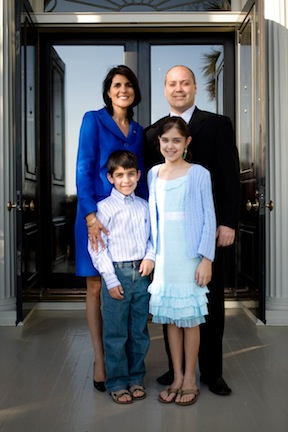GOP front-runner Nikki Haley’s conversion to Christianity from Sikhism is causing a stir in the primary race for governor of South Carolina.
CNN reports that her ties to the Sikh tradition have left some evangelicals in the state uneasy. She has said that she regularly attends a Methodist church but occasionally visits a Sikh temple in honor of her family.
Haley, who faces a runoff against her opponent on June 22, recently launched an ad with an appeal to her faith. “I am a woman that understands, through the Grace of God, with him all things are possible,” she says at the end.
Gina Smith of The State reports that Haley’s conversion came after her marriage.
Haley’s campaign has said in recent weeks that, since her 1997 conversion to Christianity, she consistently has attended a Methodist church and occasionally attended Sikh services at her parents’ request. Haley and one of her brothers converted to Christianity as adults; her parents and two other siblings are Sikhs.
Haley’s conversion at the age of 24 was influenced by her husband, Michael, raised as a Methodist.
The two married in 1996 in two ceremonies, one Methodist and one Sikh.
“(Religion) was something (husband Michael and I) talked about a lot,” Haley said Monday. “He was brought up Methodist, Christian, and I was brought up Sikh, and so you talk about the similarities and you talk about the differences, and even more so when you’re getting married and you’re going to have kids, it becomes a very real thing on how you want to raise your kids.”

The photo on the right was posted on Haley’s website before Easter. “This is a wonderful time to remember the greatness of God’s love and His sacrifice for us while we are surrounded by the ones we love,” she said.
Republican state Sen. Jake Knotts apologized but refused to resign over calling Haley a “raghead.”
Update: Gerald McDermott, religion professor at Roanoke College and author of God’s Rivals, spoke with CT by e-mail about some of Sikhism’s defining traits.
They combine teachings of Hindu bhakti (devotion to a personal god) and Muslim mysticism (direct communion with the divine in Sufism).
Sikhs are monotheists who reject Hindu idolatry and the caste system. Unlike Muslims, they believe there was new revelation after the completion of the Qur’an—particularly to their founder Guru Nanak (b. AD 1469).
They are known for the five k’s: kesa (uncut hair), kangha (a comb to show they have not renounced the world), kara (a steel bracelet), kachh (short breeches to show cleansing), and kirpan (a sword for protection, but often just an outline etched in the comb).
On her website, she recently changed the wording on her website to the question, “Is Nikki a Christian?”
Truth: In Nikki’s words: “My faith in Christ has a profound impact on my daily life and I look to Him for guidance with every decision I make. God has blessed my family in so many ways and my faith in the Lord gives me great strength on a daily basis. Being a Christian is not about words, but about living for Christ every day.”
A few months ago, the response offered different wording:
Truth: Nikki is a Christian. In her words: ‘I believe in the power and grace of Almighty God. I know, and have truly experienced, that with Him all things are possible. I have looked to Him for leadership throughout my career and will continue to do so as governor.








